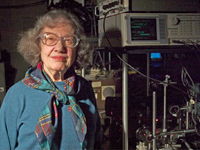Research Professor, Departments of Chemistry and Physics, University of Rochester, Rochester, New York, USA
Country of Birth: USA
Educational background: PhD Physics, University of Chicago, USA; MS Physics, University of Rochester, USA; BA Physics, Brooklyn College, USA
Awarded National Medal of Science, November 2010
 Primary responsibilities of your current job
Primary responsibilities of your current job
In earlier days, I was a university physics professor—teaching physics classes, doing research on subjects chosen because they were of interest to me and to the physics and engineering communities, publishing paperson completed research, and traveling to conferences around the world to present papers on my work and discuss them with other professionals. Now that I am older, I do not attend many meetings but I still do research with collaborators and publish the results. My research for the last several years has been centered on understanding the motion of an excess electron or missing electron on the base stack of DNA. This motion is necessary for the execution of many bodily functions.
Biggest obstacle or challenge that you have faced in your careerEarly in my career, my biggest obstacle was being a woman, which made it difficult to get a good job in physics. During graduate school, I found a summer job as an "assistant engineer" at Western Electric, the equipment manufacturing arm of Bell Telephone Company. After a couple of weeks on the job, I was demoted to "engineer’s assistant" because, I was told, there was no payroll classification for women in the former job. After I got my PhD, I applied for a position in the IBM Research Laboratories and was turned down because they had a rule against hiring married women. I got a job in a less prestigious research lab and continued working. My situation improved after I had published a number of papers and acquired a reputation. Fortunately, the situation for jobs in science is much better for women these days.
Advice you wish you had received when you were first starting outThere should be more emphasis on mentoring young women, particularly to give them a better picture of what life as a working scientist is like. That alone should make them more interested in a career in the sciences. More important, it would help them in making adjustments early in their career. If I had known what to expect when I started, my early days would have gone much better.
 Primary responsibilities of your current job
Primary responsibilities of your current job